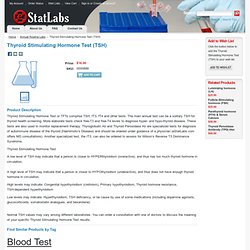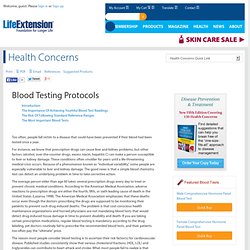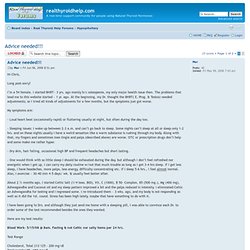

Optimal Lab Values–how to interpret your results. Thyroid Stimulating Hormone Test. Thyroid Stimulating Hormone Test or TFTs comprise TSH, fT3, fT4 and other tests.

The main annual test can be a solitary TSH for thyroid health screening. More elaborate tests check free-T3 and free-T4 levels to diagnose hyper- and hypo-thyroid disease. These tests are also used to monitor replacement therapy. Thyroglobulin Ab and Thyroid Peroxidase Ab are specialized tests for diagnosis of autoimmune disease of the thyroid (Hashimoto’s Disease) and should be ordered under guidance of a physician (eStatLabs.com offers MD consultations). Another specialized test, the rT3, can also be ordered to assess for Wilson’s Reverse T3 Dominance Syndrome. Thyroid Stimulating Hormone Test A low level of TSH may indicate that a person is closer to HYPERthyroidism (overactive), and thus has too much thyroid hormone in circulation. A high level of TSH may indicate that a person is closer to HYPOthyroidism (underactive), and thus does not have enough thyroid hormone in circulation.
Thyroid Stimulating Hormone Test. Blood Testing - Thyroid, Thyroid Gland, Blood Tests. Too often, people fall victim to a disease that could have been prevented if their blood had been tested once a year.

For instance, we know that prescription drugs can cause liver and kidney problems, but other factors (alcohol, over-the-counter drugs, excess niacin, hepatitis C) can make a person susceptible to liver or kidney damage. These conditions often smolder for years until a life-threatening medical crisis occurs. Because of a phenomenon known as “individual variability,” some people are especially vulnerable to liver and kidney damage. The good news is that a simple blood chemistry test can detect an underlying problem in time to take corrective action.
The average person older than age 60 takes several prescription drugs every day to treat or prevent chronic medical conditions. The reason most people consider blood testing is to ascertain their risk factor(s) for cardiovascular disease. View topic - spacey feeling...floaty head. View topic - Advice needed!!! Hi Chris, Long post-sorry!

I’m a 54 female. I started BHRT~ 3 yrs. ago mainly b/c osteopenia, my only major health issue then. The problems that lead me to this website started ~ 1 yr. ago. At the beginning, my Dr. thought the BHRT( E, Prog. & Testos) needed adjustments; so I tried all kinds of adjustments for a few months, but the symptoms just got worse. My symptoms are: - Loud heart beat (occasionally rapid) or fluttering usually at night, but often during the day too. - Sleeping issues: I wake up between 2-3 a.m. and can’t go back to sleep. . - Dry skin, hair falling, occasional high BP and frequent headaches but short lasting. - One would think with so little sleep I should be exhausted during the day, but although I don’t feel refreshed nor energetic when I get up, I can carry my daily routine w/not that much trouble as long as I get 3-4 hrs sleep.
About 2 ½ months ago, I started Celtic Salt (1/4 teas. Here are my test results: Blood Work- 5/15/08 @ 8am. Ferritin 39 10 - 232 ng/dl Mar.